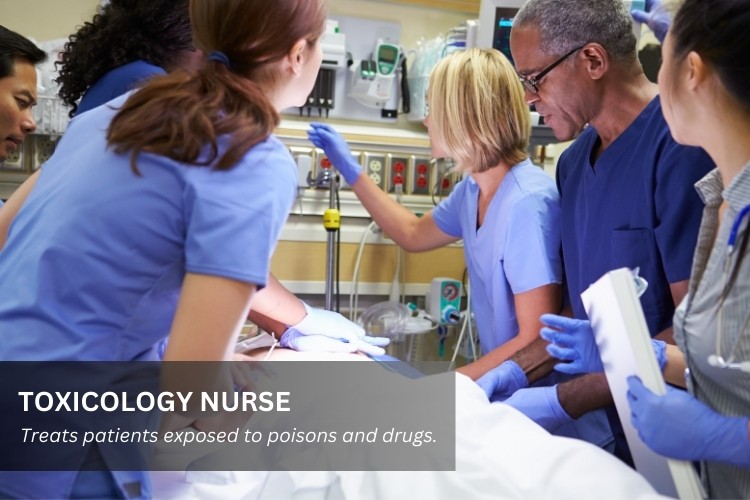Toxicology Nurse
Nursing Career Guide

When exposure to harmful substances occurs, Toxicology Nurses step in to assess the situation and deliver timely, specialized care. These nurses assist with the treatment of poisoning, overdoses, chemical exposures, and adverse drug reactions, often working in emergency departments or poison control centers. They collaborate with toxicologists, pharmacists, and emergency teams to stabilize patients and provide critical education on prevention and follow-up care. Let's delve into the Toxicology Nurse specialty and explore what it takes to thrive in this high-stakes and clinically focused career in nursing.
Overview
What Is a Toxicology Nurse?
A Toxicology Nurse is a Registered Nurse (RN) who specializes in the assessment, treatment, and management of patients exposed to toxic substances. These nurses respond to cases involving drug overdoses, environmental exposures, industrial chemicals, envenomations, and poisonings from household products.
Toxicology Nurses work in poison control centers, emergency departments, intensive care units (ICU), and specialty toxicology units. They may also provide phone-based support, educating healthcare professionals and the public about managing exposure to toxic agents.
This career requires advanced knowledge of pharmacology, poison management protocols, and emergency care procedures to prevent serious harm or death.
Education
How To Become a Toxicology Nurse
Becoming a Toxicology Nurse requires a combination of traditional nursing education, clinical experience, certification, and specialized training in emergency or critical care settings. Follow these steps to enter this challenging and rewarding healthcare career:
- Earn a Nursing Degree. Complete an Associate Degree in Nursing (ASN) or a Bachelor Degree in Nursing (BSN). A BSN is strongly preferred for toxicology roles, especially in clinical and research settings.
- Pass the NCLEX-RN. Obtain your nursing license by passing the National Council Licensure Examination for Registered Nurses (NCLEX-RN).
- Gain Clinical Experience. Work as a Registered Nurse (RN) in emergency departments, poison centers, or critical care units to build expertise in managing toxic exposures.
- Pursue Specialized Training. Attend continuing education in toxicology, pharmacology, and poisoning management. Some poison centers provide structured orientation and mentorship programs for nurses entering this field.
- Optional Certification. While not mandatory, certification such as the Certified Specialist in Poison Information (CSPI) through the American Association of Poison Control Centers can enhance professional credibility.
On average, it takes 4-6 years to become a Toxicology Nurse, including nursing school, licensure, and specialized training. Nurses often transition into this field after gaining experience in high-acuity environments like the ER or ICU.

Average Salary
How Much Does a Toxicology Nurse Make?
Salaries for Toxicology Nurses vary based on work setting, geographic location, and experience level. On average, a Toxicology Nurse can expect to earn between $80,000 and $110,000 annually.
Average annual salary for a Toxicology Nurse:
- Entry-level: $80,000 - $90,000 per year.
- Mid-career: $90,000 - $100,000 per year.
- Experienced: $100,000 - $110,000 per year.
The U.S. Department of Labor includes Toxicology Nurses under general RN categories, with an average hourly wage of approximately $42.00 per hour. This equates to an annual salary of around $87,360, with variations depending on the employer (clinical vs. call center) and region.
Job Duties
What Does a Toxicology Nurse Do?
Toxicology Nurses assess and manage toxic exposures, respond to emergencies, and provide critical information to the public and healthcare providers. They often serve as a frontline resource in poison control and toxicology consults.
The most common job duties of a Toxicology Nurse:
- Evaluating Toxic Exposures. Gather information on the substance involved, the amount ingested or contacted, and patient symptoms.
- Providing Poison Control Support. Offer advice to healthcare providers, first responders, and the public on managing poison exposures over the phone or in person.
- Assisting with Emergency Treatment. Administer antidotes, activated charcoal, and supportive therapies in acute poisoning cases.
- Collaborating with Medical Toxicologists. Assist in evaluating rare or complex exposure cases alongside physicians specializing in toxicology.
- Monitoring Patient Response. Track vital signs, lab results, and clinical symptoms during recovery from toxic exposure.
- Educating the Public. Participate in community outreach or hotline services to inform the public about poison prevention and safe handling of chemicals or medications.
- Documenting Cases. Maintain detailed records for reporting, research, or public health surveillance of poisoning trends.
- Advanced Duties. Experienced Toxicology Nurses may engage in research, policy development, or emergency preparedness planning related to hazardous materials.
Toxicology Nurses work in poison control centers, telephone triage, hospitals, academic institutions, and public health agencies. Their role is essential in preventing complications and saving lives through rapid, evidence-based interventions.

Essential Skills
What Skills Does a Toxicology Nurse Need?
Toxicology Nurses require advanced critical thinking, detailed knowledge of toxic agents, and excellent communication skills. They must be able to respond quickly and confidently in high-stakes situations.
Here are some of the skills a Toxicology Nurse needs to succeed:
- Toxicology Knowledge. Understand the effects of drugs, chemicals, plants, venoms, and household substances on the body.
- Emergency Assessment. Evaluate airway, breathing, and circulation in patients experiencing toxic reactions, substance abuse, or overdoses.
- Poison Control Communication. Deliver calm, clear instructions to distressed callers or clinical teams under time pressure.
- Pharmacology Expertise. Administer antidotes and understand half-lives, interactions, and absorption patterns of toxins.
- Decision-Making Under Pressure. Make rapid, safe care recommendations with limited information in high-risk cases.
- Documentation and Reporting. Maintain detailed and legally sound records of toxic exposure cases and treatment protocols.
- Public Education. Teach poison prevention, medication safety, and emergency preparedness in community settings.
- Team Collaboration. Work with toxicologists, pharmacists, emergency physicians, and hazmat teams when needed.
One of the biggest challenges of being a Toxicology Nurse is staying current with evolving toxins, treatments, and guidelines across a broad spectrum of exposure types. However, the role is highly rewarding, as it empowers nurses to protect individuals, educate communities, and respond to critical health threats with confidence and care.
Last updated: August 24, 2025
References:
- Registered Nurses. Bureau of Labor Statistics, U.S. Department of Labor. Occupational Outlook Handbook. Retrieved August 24, 2025.
- NCLEX Nurse Licensure Exam. National Council of State Boards of Nursing (NCSBN). Retrieved August 24, 2025.
- Toxicology Nurse Salary in the United States. ZipRecruiter, Healthcare Career Path. Retrieved August 24, 2025.
- How To Become a Registered Nurse. Indeed, Healthcare Career Guide. Retrieved August 24, 2025.
- Toxicology Nurse. Johnson & Johnson, Nursing Careers. Retrieved August 24, 2025.
- American College of Medical Toxicology (ACMT). Resources to enhance understanding and assist Medical Toxicologists and other medical professionals. Retrieved August 24, 2025.
- American Academy of Clinical Toxicology (AACT). Professional organization of scientists and clinicians advancing research, education, prevention and treatment of diseases caused by chemicals, drugs and toxins. Retrieved August 24, 2025.
- Poison and Prevention Information. Online tool to get specific recommendations based on age, substance, and amount. Retrieved August 24, 2025.
- Certification for Specialists in Poison Information (CSPI). American Association of Poison Control Centers (AAPCC). Retrieved August 24, 2025.
- Environmental Health Certificate. University of Maryland School of Nursing, Graduate Certificates. Retrieved August 24, 2025.
- Environmental and Occupational Health Certificate. Rutgers University School of Public Health, Academic Certificate Programs. Retrieved August 24, 2025.


